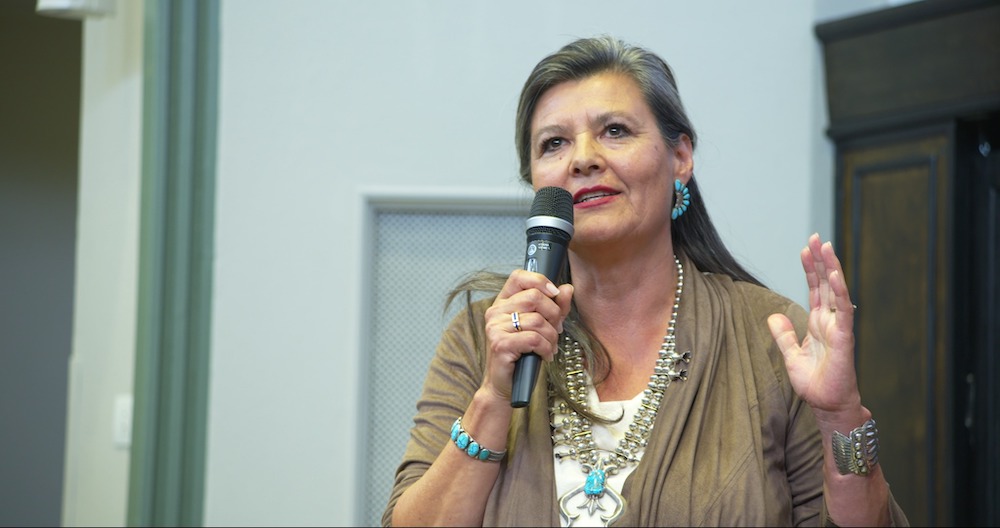
- Details
- By Darren Thompson
Pearl Daniel-Means, a renowned Diné filmmaker, activist and writer, passed away on Saturday, May 28, according to her business partner Shannon Kring. Daniel-Means was 62. The cause of her death has not been disclosed by her family.
Born into the Ashiihi (Salt) Clan of the Navajo Nation, Daniel-Means was given a Lakota name Iyoyanbya Izanzan Win, which translates to “Bright Light.”
“Pearl more than lived up to her Lakota name and she was a bright light in my life and in this world,” Kring told Native News Online. “Even those who did not have the honor of knowing her personally were touched by her tireless work to bring to light the struggles and triumphs of Indigenous peoples.”
Daniel-Means spoke around the world on matters concerning Indigenous issues, human rights, and environmentalism. She was married to American Indian activist, author, artist, and actor Russell Means until his death in 2012, and was his business manager and collaborator on many projects.
Daniel-Means is the co-producer of the film “End of the Line: The Women of Standing Rock,” which streams on Peacock beginning June 2. Directed by Kring, the film documents the women who risked their lives to fight the Dakota Access Pipeline in late 2016 through early 2017 on the Standing Rock Indian Reservation in North Dakota.
On Tuesday evening, the film's Facebook page posted news of Daniel-Means' passing: "It is with deepest sorrow that we announce that our beloved sister and co-producer Pearl Means has transcended. Born into the Ashiihi (Salt) Clan of the Navajo Nation, Pearl was a film producer, activist, author, daughter, sister, mother, and grandmother who spoke around the world—from New Zealand to South Africa, and from Ecuador to Finland—on matters concerning Indigenous issues, human rights, and environmentalism. Her Lakota name, Iyoyanbya Izanzan Win, translates loosely to 'Bright Light.' Her name could not be more fitting. Rest in power, sister. We love you."
In the last few years, Daniel-Means served on the board of directors for several organizations that serve Indigenous people, including the Lakota People’s Law Project, which made an announcement on social media sharing the passing of Means. “She was one of our most incredible supporters and board members,” the Lakota People’s Law Project wrote in a statement on Tuesday. “We will share more about her impact and life in the near future.”
Daniel-Means is survived by her father, Ernest Wayne Daniel; her sisters, Patricia Rose Daniel, Rebecca Ann Daniel, Naomi Kathleen Daniel, Roberta Lea Daniel-Trotter; her children, Tessica Dawn Baca, Trista Cheryal Baca, and Brandon James Norwick (Alexandrea); her granddaughter, Arya Kaya-Pearl Robertson; and her life partner, Dr. Edmund Keli’i Paki-Silva, Jr.
More Stories Like This
Native News Weekly (August 25, 2024): D.C. BriefsUS Presidents in Their Own Words Concerning American Indians
Indigenous Actor Elaine Miles Reports Detention by Alleged ICE Agents
Happy Thanksgiving from Native News Online
Coming Up on Native Bidaské: Behind the Animation: Joey Clift Talks “Pow” and Native Storytelling
Help us tell the stories that could save Native languages and food traditions
At a critical moment for Indian Country, Native News Online is embarking on our most ambitious reporting project yet: "Cultivating Culture," a three-year investigation into two forces shaping Native community survival—food sovereignty and language revitalization.
The devastating impact of COVID-19 accelerated the loss of Native elders and with them, irreplaceable cultural knowledge. Yet across tribal communities, innovative leaders are fighting back, reclaiming traditional food systems and breathing new life into Native languages. These aren't just cultural preservation efforts—they're powerful pathways to community health, healing, and resilience.
Our dedicated reporting team will spend three years documenting these stories through on-the-ground reporting in 18 tribal communities, producing over 200 in-depth stories, 18 podcast episodes, and multimedia content that amplifies Indigenous voices. We'll show policymakers, funders, and allies how cultural restoration directly impacts physical and mental wellness while celebrating successful models of sovereignty and self-determination.
This isn't corporate media parachuting into Indian Country for a quick story. This is sustained, relationship-based journalism by Native reporters who understand these communities. It's "Warrior Journalism"—fearless reporting that serves the 5.5 million readers who depend on us for news that mainstream media often ignores.
We need your help right now. While we've secured partial funding, we're still $450,000 short of our three-year budget. Our immediate goal is $25,000 this month to keep this critical work moving forward—funding reporter salaries, travel to remote communities, photography, and the deep reporting these stories deserve.
Every dollar directly supports Indigenous journalists telling Indigenous stories. Whether it's $5 or $50, your contribution ensures these vital narratives of resilience, innovation, and hope don't disappear into silence.
 The stakes couldn't be higher. Native languages are being lost at an alarming rate. Food insecurity plagues many tribal communities. But solutions are emerging, and these stories need to be told.
The stakes couldn't be higher. Native languages are being lost at an alarming rate. Food insecurity plagues many tribal communities. But solutions are emerging, and these stories need to be told.
Support independent Native journalism. Fund the stories that matter.
Levi Rickert (Potawatomi), Editor & Publisher
